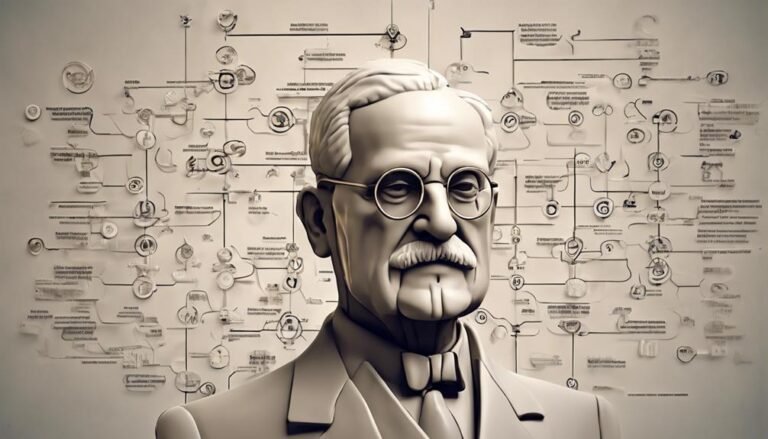The Role of Henry Murray in Personality Research
You may have heard about Henry Murray's significant contributions to personality research, particularly through his creation of the Thematic Apperception Test (TAT). However, his impact goes far beyond this well-known assessment tool. Exploring how Murray's intricate understanding of human needs and motivations influenced not just his own work, but also the broader field of psychology, could shed light on the complexities of personality dynamics and the enduring relevance of his theories in contemporary research.
Key Takeaways
- Pioneered Needs Theory, emphasizing individual differences and motivations.
- Developed the Thematic Apperception Test (TAT) for assessing personality.
- Collaborated with influential psychologists like Jung and Erikson.
- Integrated cultural contexts into personality research.
- Established the concept of 'personology' at the Harvard Psychological Clinic.
Early Life and Education
Henry Murray's early life and education laid a strong foundation for his groundbreaking contributions to personality research. Early influences on Murray included his upbringing in New York City and his exposure to diverse intellectual discussions in his household. These formative experiences instilled in him a curiosity about human behavior and the factors that shape personality.
Murray's educational background further shaped his approach to studying personality. After completing his undergraduate studies at Harvard University, he pursued a doctorate in biology at Cambridge University. This interdisciplinary background equipped him with a unique perspective that blended biological and psychological insights.
Murray's early influences and educational experiences molded his interest in the complexities of human nature and set the stage for his future work in personality research. His ability to integrate diverse fields of knowledge would later prove instrumental in the development of his influential theories.
Development of Needs Theory
The development of Murray's Needs Theory marked a significant advancement in the field of personality research, shedding light on the underlying motivations that drive human behavior. Murray's motivation theory emphasized the importance of psychological needs in shaping individuals' actions and personalities.
According to Murray, these needs are intrinsic forces that push individuals to fulfill certain desires and maintain psychological well-being.
Murray identified a set of fundamental psychological needs that he believed were universal across individuals. These needs included achievement, affiliation, power, autonomy, and recognition among others. He proposed that these needs interacted in complex ways to influence an individual's behavior and personality development.
Murray's Needs Theory contributed to a deeper understanding of how internal drives and desires impact human behavior. By recognizing the diverse psychological needs that individuals aim to satisfy, Murray's theory laid a foundation for further research in personality psychology and motivation theory.
It highlighted the intricate interplay between these needs and provided a framework for studying how they shape an individual's thoughts, feelings, and actions.
Thematic Apperception Test (TAT)
Murray's Needs Theory served as the theoretical foundation for the development and application of the Thematic Apperception Test (TAT) in personality assessment. The TAT is a projective assessment tool where individuals are presented with ambiguous images and asked to create stories about them. The main idea behind the TAT is that people will project their own unconscious thoughts, feelings, and motivations onto the stories they create, allowing trained psychologists to gain insights into the person's inner world.
Symbolic interpretation plays a significant role in TAT analysis, as the stories constructed often contain symbols that reflect the individual's underlying psychological processes.
Through the TAT, psychologists can uncover aspects of a person's personality that may not be readily apparent through other assessment methods. By analyzing the themes, characters, and emotions present in the narratives, clinicians can gain a deeper understanding of the individual's psychological makeup. The TAT remains a valuable tool in psychological assessment due to its ability to reveal unconscious aspects of personality through the interpretation of symbolic content.
Collaborations With Carl Jung
You're about to explore the Jung-Murray Research Alliance and its significant influences on personality theory.
This collaboration between Henry Murray and Carl Jung paved the way for a deeper understanding of personality development and individual differences.
Jung-Murray Research Alliance
Collaborations with the renowned psychologist Carl Jung greatly impacted Henry Murray's approach to personality research. Through their collaborative research, Murray and Jung engaged in a profound exploration of psychological theories, enriching their understanding of human behavior.
Jung's emphasis on the collective unconscious and archetypes resonated with Murray's own interest in the unconscious determinants of behavior, leading to a fruitful exchange of ideas that influenced Murray's subsequent work. The Jung-Murray Research Alliance not only broadened Murray's theoretical framework but also influenced his methodological approach.
Jung's concepts, such as individuation and the persona, provided Murray with new perspectives on personality development and the interplay between conscious and unconscious processes. This collaboration encouraged Murray to integrate Jungian ideas into his own research, contributing to the evolution of his holistic approach to personality assessment.
Influences on Personality Theory
The collaboration with Carl Jung profoundly influenced Henry Murray's approach to personality theory, introducing new perspectives and enriching his research framework. Murray's work with Jung provided a bridge between Freudian influences and Jung's theoretical perspectives, blending psychodynamic concepts with Jung's ideas on the collective unconscious and archetypes.
This collaboration expanded Murray's understanding of the complexities of human personality, emphasizing the role of unconscious processes and symbolic meanings in shaping behavior.
Moreover, Jung's emphasis on cross-cultural studies and environmental factors resonated with Murray, prompting a deeper exploration of how cultural contexts and external influences impact personality development. By integrating Jung's insights into his own research, Murray was able to create a more all-encompassing framework that considered both universal psychological principles and the diverse cultural variations in personality expression.
Harvard Psychological Clinic
You'll now explore Henry Murray's significant contributions to the Harvard Psychological Clinic. Analyzing his research impact within the clinic setting will provide valuable insights into his pioneering work in personality psychology.
Understanding Murray's legacy at the clinic will shed light on his lasting influence in the field of psychology.
Murray's Clinic Contributions
Within the domain of personality research, Henry Murray made significant contributions through his work at the Harvard Psychological Clinic. Murray's clinic contributions were marked by his innovative integration of clinical practice and a psychoanalytic approach.
At the clinic, Murray focused on understanding the complex interplay between an individual's unconscious desires, early life experiences, and their current behaviors.
Through his psychoanalytically informed clinical work, Murray developed the Thematic Apperception Test (TAT), a projective psychological test designed to reveal a person's unconscious thoughts, desires, and motivations through their interpretation of ambiguous images. This test became a cornerstone in personality assessment and provided valuable insights into individuals' underlying psychological dynamics.
Murray's clinic contributions also extended to his development of the concept of 'personology,' which emphasized the holistic study of an individual's personality through a multidimensional framework.
Research Impact Analysis
Henry Murray's research impact at the Harvard Psychological Clinic is a pivotal aspect of his enduring legacy in the field of personality research. His innovative research methodologies and meticulous data interpretation techniques set a strong foundation for future studies in personality psychology.
Murray's emphasis on exploring the complexities of human behavior through in-depth case studies and psychobiographical analyses revolutionized the way personality research was conducted. The long-term implications of Murray's work are profound, shaping the trajectory of personality research for years to come.
His focus on the interaction between environmental factors and individual characteristics paved the way for a more holistic understanding of personality development. Additionally, Murray's contributions to the field continue to inspire researchers to investigate further into the intricacies of personality, seeking to uncover new insights and directions for future studies.
As researchers continue to build upon Murray's work, exploring new methodologies and pushing the boundaries of data interpretation, the field of personality research is poised to make significant strides towards a more thorough understanding of human behavior.
Legacy in Psychology
Moreover, Murray's lasting impact on psychology, particularly at the Harvard Psychological Clinic, underscores the enduring significance of his contributions to the field of personality research. His psychological influence within the clinic was profound, shaping not only the way personality theory was approached but also the methodologies used in studying individual differences.
Murray's research contributions were instrumental in advancing the understanding of personality dynamics, emphasizing the interplay between internal and external factors in shaping behavior.
The academic legacy left by Murray at the Harvard Psychological Clinic continues to resonate in contemporary psychology. His innovative approaches to studying personality, such as the Thematic Apperception Test (TAT), have become foundational tools in psychological assessment.
Moreover, Murray's emphasis on the importance of context and the individual's unique experiences in shaping personality development has had a lasting impact on modern psychological research.
Legacy and Influence
The enduring impact of Henry Murray's work can be observed in the significant contributions he made to the field of personality research. Murray's research methodology and theoretical contributions have left a lasting impression on the field, shaping the way psychologists approach the study of personality.
His development of the Thematic Apperception Test (TAT) revolutionized the understanding of unconscious processes and motivations, providing psychologists with a valuable tool for evaluating personality traits and dynamics.
In the historical context of academic influence, Murray's work during the mid-20th century had a profound effect on the field of psychology. His collaboration with other prominent psychologists of his time, such as Erik Erikson and Gordon Allport, further solidified his reputation as a key figure in personality research.
Murray's emphasis on the importance of the individual's unique experiences and internal conflicts helped pave the way for future research in personality psychology, leaving a legacy that continues to influence the field today.
Criticisms and Controversies
Several critiques have surfaced regarding the methodology and interpretative validity of Henry Murray's Thematic Apperception Test (TAT) in contemporary personality research. One criticism revolves around the subjective nature of TAT scoring, which relies heavily on the judgment of the examiner, potentially introducing bias into the results. Critics argue that the lack of standardized scoring criteria can lead to inconsistencies in interpretation and limit the test's reliability.
Controversies also surround the TAT's psychometric properties, with some researchers questioning its overall validity and reliability as a measure of personality traits. The test's open-ended nature has been criticized for lacking the specificity and objectivity required for rigorous scientific assessment. Additionally, concerns have been raised about the test's limited cross-cultural applicability, suggesting that the themes and images presented in the TAT may not resonate equally across different populations.
Despite its historical significance, the TAT continues to face scrutiny in modern personality research due to these criticisms and controversies. Researchers are actively exploring alternative assessment tools that offer greater standardization and objectivity in evaluating personality traits.
Impact on Modern Personality Research
Critiques and controversies surrounding the Thematic Apperception Test (TAT) have prompted a reevaluation of its impact on modern personality research methodologies. The TAT, developed by Henry Murray, has been a cornerstone in understanding unconscious processes and motivations.
However, its subjective interpretation and lack of standardized scoring have raised concerns about its reliability and validity in contemporary research methodologies.
Modern personality research has shifted towards more objective measures and quantitative analysis, leading to a reassessment of the TAT's place in psychological frameworks. While the TAT has historical significance and has influenced theoretical advancements in personality psychology, its practical utility in current research practices is debated.
Contemporary applications of personality research often favor structured assessments and statistical validation, which challenge the subjective nature of the TAT. As researchers aim for methodological rigor and replicability, the TAT's role in shaping modern personality research methodologies is being reexamined to align with the evolving standards of the field.
Conclusion
To sum up, Henry Murray's impact on personality research can't be overstated. His pioneering work in developing the Needs Theory and creating the Thematic Apperception Test revolutionized how we comprehend human behavior.
By collaborating with influential psychologists and emphasizing the importance of unconscious processes, Murray has left a lasting legacy that continues to shape modern psychological research.
His contributions have truly transformed the field of personality dynamics.







